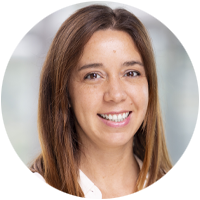
Ana is a family doctor and academic who has spent the last decade focusing on research in digital health. Currently, she is director of the Global Digital Health Unit and a senior clinical lecturer in digital health at Imperial College London. In her role, she leads two research teams, overseeing a multidisciplinary group ranging from research fellows and post-doctoral researchers to PhD and master's students. Ana's work involves co-design, implementation, and evaluation of digital innovations in health care, collaborating with both national and international organizations. She has acted as a consultant and invited expert for the WHO, UN, OECD, and the World Organization of General Practice.
What made you interested in taking the Global Health Care Leaders Program at HMS?
The word "global" was actually what made the deal for me. During my medical training, I was always looking for volunteer opportunities in various countries. As a volunteer doctor in Senegal, Mozambique, and Guinea Bissau, in the early stages of my medical career, I really enjoyed being exposed to a world so different from what I was used to and was excited about the potential of learning from each other. That was also the to pursue a PhD abroad—I wanted to challenge my perspectives, expose myself to new things, and perhaps value my own context more, having a broader view of the world.
Before enrolling in the course, I had just started a new job as director of a Global Digital Health Unit at Imperial. At that point in my career, I wanted to develop further my leadership skills. So, seeing a program that included both leadership and global health was very appealing. Another factor that attracted me was that the program was delivered in-person. This was a positive factor for my decision, at a time - despite being hyperconnected through the internet and social media, we often still remain in our own social bubbles. The fact that the program was in person, with a group of people I had no say in selecting – nor potentially biasing that networking process - was also quite appealing.
What were you hoping to get out of the program?
Those were the two main reasons I pursued the program, to improve my technical capacities and to expand my network. I come from an academic background in the UK and Europe, having done most of my research in Europe, Africa and Asia. My exposure to the U.S. health care ecosystem was much less strong, outside of Europe was a short internship at the Cambridge Health Alliance, in Boston, in 2010. I was eager to learn more about the U.S. health care system, its intricacies, and this program offered a great opportunity for that.
How was your experience during the program? What did you find most useful or interesting?
I was impressed not only by the faculty and speakers’ knowledge but also by how they provoked us to think about our own settings and find answers for ourselves. I think that comes with a certain level of maturity that you can only experience in executive programs, where the focus shifts from delivering content to co-learning and collaboratively finding solutions. For me, that was a very interesting experience, coming from my experience teaching in PhD and post-graduate programs, where we tend to be much more prescriptive.
I really enjoyed the range of speakers. They were very inspiring, and it was really interesting to see how they weave their personal experiences into theory. I also enjoyed the capstone projects; they were a good platform for us to see how the cohort would see their careers launching from there and also start mapping potential interactions moving forward.
Are there any learnings from your experience that you’ve applied to your work?
A huge part of the program was actually on digital innovation, which is my specific area of interest – this was a very good surprise. A lot of the concepts on leadership, but also user-centered design, were very helpful, and I have had a chance to apply them in my current portfolio of work.
One of the biggest advantages to being part of the program was also to be exposed to more opportunities within Harvard. While I was there, I was made aware of the Ariadne Labs International Fellowship - to which I successfully applied, and I am developing work as a visiting scholar at the T.H. Chan School of Public Health. I think that was very, very relevant for me.
Would you recommend this program to other health care professionals? If so, why?
I would and have, actually. I've formally recommended it to two people. One is someone from my team, and the other is someone completely unrelated who just heard about what I was doing and wanted to reach out. My feedback has been very positive. I definitely think it’s a great opportunity for anyone interested in global health, leadership - or both!